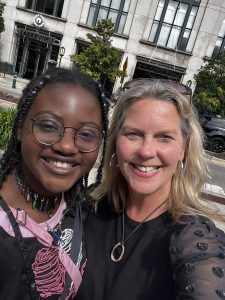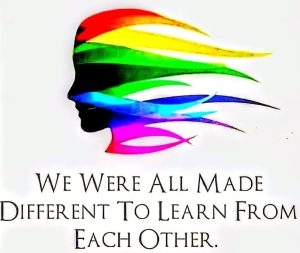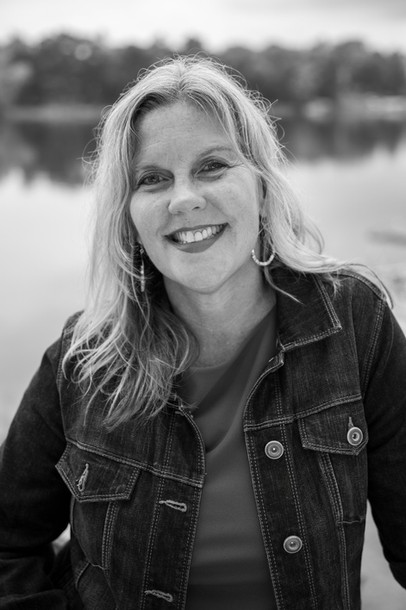 This photo was taken yesterday on the Adoption Day anniversary of my beautiful daughter Kenya. Today is Juneteenth. Both are important days to me as a transracial adoptive white Mother of an African American girl, and a Leadership Coach who teaches how to create inclusive collaborative teams and workplaces.
This photo was taken yesterday on the Adoption Day anniversary of my beautiful daughter Kenya. Today is Juneteenth. Both are important days to me as a transracial adoptive white Mother of an African American girl, and a Leadership Coach who teaches how to create inclusive collaborative teams and workplaces.
In the anti-DEI era we are living in now, it feels so critical to reinforce why it’s important to teach about differences and the power of inclusive freedom.
Let me tell you why from my real-life mama experience….
My dear daughter Kenya pictured above with me has encountered discriminatory comments since I fostered her by myself as a single Mother when she was an 8-day old little baby. People often don’t believe this is still happening, but we are living this daily. I have story after story that would make a novel. Regular comments & questions that demean her because of her skin color or being adopted such as (just to name a few):
- Where are your real parents, what happened? I’m sorry for you…are you from an orphanage?
- Why is your hair braided? Don’t you wash your hair?
- Are you from Africa? Oh your from Detroit, there is so much poverty and crime there…
- It’s amazing you are so smart (said with surprise)
- Why is your adoptive mom white? Where is your Dad?
I want a better world for her and for all people of color and differences. Not just to survive learning resilience and overcoming prejudice, but one that supports all to THRIVE.
Many of these comments are unintentional by uneducated kids with good hearts. MANY are by adults that have no idea about the impact of their statements, and some are just plain judgmental or bigoted. But where does anyone learn bias and judgements – intentional or not?
Adults at home where we grow up and those that are leading our society and organizations that set our norms.
The common theme every time there is a negative situation, or comment is LACK OF AWARENESS about family differences, history or culture of black people – or subconscious racial bias or family stereotype views.
 This is why holidays like today matter. We must keep learning and celebrating progress and developing awareness in ourselves, our families, workplaces, schools and community groups.
This is why holidays like today matter. We must keep learning and celebrating progress and developing awareness in ourselves, our families, workplaces, schools and community groups.
The key is in LEARNING and leveraging all our differences.
If that scares you a little or you aren’t sure where to begin, read my blog on 3 steps you can take to learn and lead more effectively around this
—–
If you are still questioning why we even need to talk about Black history and celebrate Juneteenth in the face of pushback on DEI, here are 5 reasons to consider…
1. Understand the Truth about American History so we can Improve and Not Repeat
What we hide, suppress or don’t acknowledge has a way of repeating itself, instead of learning from it to improve ourselves. Black history IS part of American history. We have historically left out large parts of the brutal truths of what really happened and how racism has gone on for so many years. From slavery to the Civil Rights Movement to cultural, scientific, and economics, understanding Black history gives a completer and more honest picture of the nation’s development and what has worked and not.
2. Acknowledging Other’s Struggles Does Not Take Away from Yours
Including holidays of other group’s struggles and victories does not take away from yours. It’s not a comparison or competition. Our country isn’t just a one-size pie when someone else gets a slice of attention, you lose yours. Expanded and including groups that historically don’t get seen or validated, or have different struggles from you, just makes the pie bigger for us all. Everyone deserves a slice at the picnic, don’t they?
3. Builds Empathy, Conflict Resolution & Collaboration Skills
When we teach and learn Black history, we help people understand differences, create deeper empathy and emotional intelligence. Understanding others’ struggles, journeys, and achievements reduces bias and helps with more effective communication, problem solving, conflict resolution, and collaboration with others.
4. Strengthens Empowerment, Contribution and Community
When we validate the experiences and identities of people who’ve been marginalized, we build confidence, connections and strength of the whole. Contrary to the myth that it lowers the standards of performance, it actually builds self-esteem and empowers people to bring their best, work together better and contribute more.
5. Creates Awareness to Support Calling Out Injustices
Knowing history helps people recognize actions that demean others, patterns of inequality and helps advocate for fairness and celebrate victories. Awareness rooted in history makes it harder to ignore or minimize intentional or unintentional systemic issues that continue today.
—–
Want to Learn More?
-
To Lean into the Racial Learning Journey – My blog on 3 steps you can take to learn and lead more effectively around this:
https://breakthroughpartner.com/2024/06/20/juneteenth-and-learning/ -
Why Not to be Color Blind and How to be Color Mindful – The blog I wrote for #A Human Workplace and with my friend Wil Johnson – Color Mindfulness: Honoring and Valuing Our Skin — A Human Workplace (makeworkmorehuman.com)
-
How to Create Brave Spaces for Inclusion and Race Conversations – My blog and video Do you create BRAVE spaces? – Breakthrough Partners and 11 steps for leaders blog with my friends at a #Center for Loving Workplace Brave Spaces: 11 Steps Towards Inclusive and Respectful Work Environments | LinkedIn
